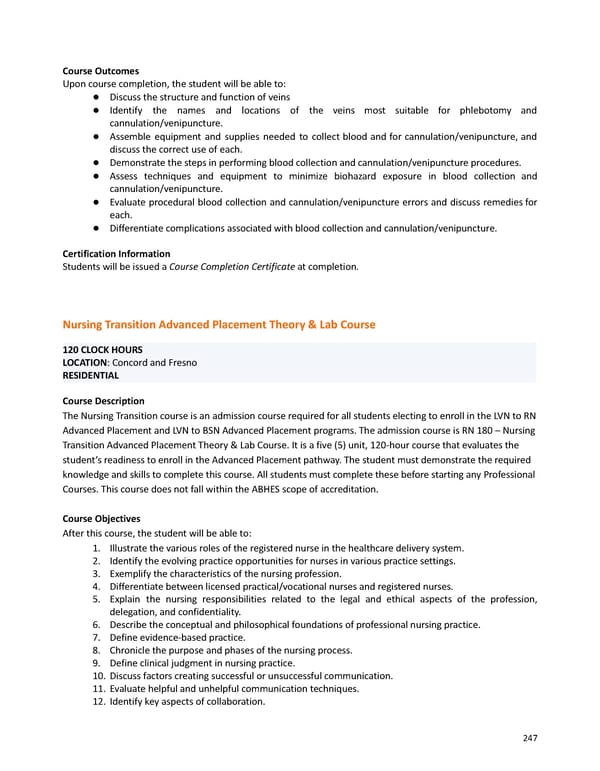CourseOutcomes Uponcoursecompletion,thestudentwillbeableto: ● Discussthestructureandfunctionofveins ● Identify the names and locations of the veins most suitable for phlebotomy and cannulation/venipuncture. ● Assemble equipment and supplies needed to collect blood and for cannulation/venipuncture, and discuss the correct use of each. ● Demonstratethestepsinperformingbloodcollectionandcannulation/venipunctureprocedures. ● Assess techniques and equipment to minimize biohazard exposure in blood collection and cannulation/venipuncture. ● Evaluate procedural blood collection and cannulation/venipuncture errors and discuss remedies for each. ● Differentiate complications associated with blood collection and cannulation/venipuncture. Certification Information Students will be issued a Course Completion Certificate at completion. NursingTransition AdvancedPlacementTheory&LabCourse 120CLOCKHOURS LOCATION:ConcordandFresno RESIDENTIAL CourseDescription TheNursingTransitioncourseisanadmissioncourserequiredforallstudentselectingtoenrollintheLVNtoRN AdvancedPlacementandLVNtoBSNAdvancedPlacementprograms.TheadmissioncourseisRN180–Nursing Transition Advanced Placement Theory & Lab Course. It is a five (5) unit, 120-hour course that evaluates the student’s readiness to enroll in the Advanced Placement pathway. The student must demonstrate the required knowledgeandskillstocompletethiscourse.AllstudentsmustcompletethesebeforestartinganyProfessional Courses. This course does not fall within the ABHES scope of accreditation. CourseObjectives After this course, the student will be able to: 1. Illustrate the various roles of the registered nurse in the healthcare delivery system. 2. Identify the evolving practice opportunities for nurses in various practice settings. 3. Exemplify the characteristics of the nursing profession. 4. Differentiate between licensed practical/vocational nurses and registered nurses. 5. Explain the nursing responsibilities related to the legal and ethical aspects of the profession, delegation, and confidentiality. 6. Describe the conceptual and philosophical foundations of professional nursing practice. 7. Define evidence-based practice. 8. Chronicle the purpose and phases of the nursing process. 9. Define clinical judgment in nursing practice. 10. Discuss factors creating successful or unsuccessful communication. 11. Evaluate helpful and unhelpful communication techniques. 12. Identify key aspects of collaboration. 247
 2023-2024 | Catalog Page 246 Page 248
2023-2024 | Catalog Page 246 Page 248